- Hey Dullblog Online Housekeeping Note - May 6, 2022
- Beatles in the 1970s: Melting and Crying - April 13, 2022
- The Beatles, “Let It Be,” and “Get Back”: “Trying to Deceive”? - October 22, 2021

Over on the “Paul’s Essential Elements” thread, in response to an excellent post by Chris Dingman, we’ve been having a fascinating conversation about what both Lennon and McCartney brought to their artistic partnership. We’re also having a conversation about it over on Mike’s post, “John Lennon: Man of the Decade,” because that’s how we roll on Dullblog. In writing a comment on Chris’ post, I mentioned that I’d read a magazine article in which McCartney identified Lennon as his hero. It was in the November 2015 issue of Mojo, in a piece titled “The Two of Us,” excerpted from Paul du Noyer’s book Conversations with Paul McCartney. Here’s the opening of the piece:
I sit with Paul McCartney as he completes a questionnaire for Mojo magazine’s All-Time Heroes issue, in 2001:
Who is your hero?
John Lennon.
When did this person first have an impact on you?
At Woolton Village Fete in the year of Our Lord Whatever.
What is it that you admire in them?
Massive talent, great wit, courage and humour.
Have they had an influence upon you?
Very much.
Have they ever disappointed you or has your admiration ever faded?
Yeah, from time to time, when we were having a barney. But only infrequently.

Paul Du Noyer
And here’s Du Noyer on the Lennon/McCartney partnership:
Their talents, in the years they worked together, were not only complementary, they were equal. Each man had his precise counterweight in the other, and the fine adjustments of that balancing seemed to create a dialectic of genius. As fellow Beatles their relationship was both collaborative and competitive–whether writing alone or in a team, they raised the collective game.
Du Noyer also imagines, in response to a magazine prompt, what might have happened if John and Paul had not met. Here are some excerpts from his account:
I see George Harrison, who has become a bus driver like his father before him . . . . “he farther one travels’ he says to Big-Nose Ritchie the bus conductor, ‘the less one knows.’ The stolid Ritchie nods, and drums a paradiddle on the canteen table. Life has been a mild disappointment for him since Rory Storm & the Hurricanes played their last Butlin’s summer season in 1966.
. . . in a bar on West 72nd Street, a drunken Scouse seaman called Johnny Lennon swears contemptuously when the flickering TV shows images of the ever-popular Paul McCartney Dance Orchestra. He gets into a fight with a moody guy from the New Jersey haulage firm of Springsteen & Son, and both are evicted.
And a few observations from me:
 I think McCartney is sincere when he identifies Lennon as his hero. He knows he needed Lennon’s daring and disdain for convention — that without that impetus, he would never have achieved what he did. And I believe he never stopped loving the man, despite the harsh words they exchanged over the years.
I think McCartney is sincere when he identifies Lennon as his hero. He knows he needed Lennon’s daring and disdain for convention — that without that impetus, he would never have achieved what he did. And I believe he never stopped loving the man, despite the harsh words they exchanged over the years.
I find Du Noyer’s vision of what the four Beatles would be doing if John and Paul hadn’t met up at the Woolton fete plausible. It’s telling that in Larry Kirwan’s Liverpool Fantasy and Mark Shipper’s Paperback Writer, McCartney becomes a successful, conventional musician, while Lennon struggles with alcohol and can’t fit into a social role.
We’re profoundly lucky that Lennon’s daring and determination kindled McCartney’s ambition, and that McCartney proved uniquely able to foster Lennon’s talent while developing his own. That’s why, almost 59 years after that fete in Woolton, music magazines are still featuring the Beatles’ picture on their covers.

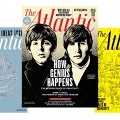
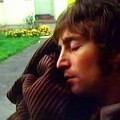
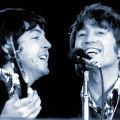
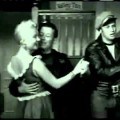
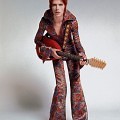
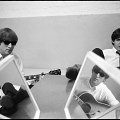
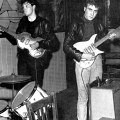
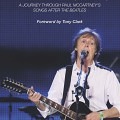
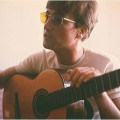
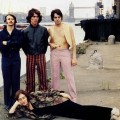
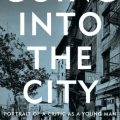
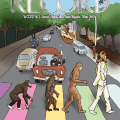
It’s telling that in Larry Kirwan’s Liverpool Fantasy and Mark Shipper’s Paperback Writer, McCartney becomes a successful, conventional musician, while Lennon struggles with alcohol and can’t fit into a social role.
I don’t understand all the theories of a John-less Paul being a “conventional” musician. Isn’t he the one who got John into tape looping for the Revolver album?
And a Paul-less John, trying to make it as a writer or artist: I don’t doubt his talent or work ethic, but I can imagine him mailing his poetry and cartoons to editors, and them scratching their heads in confusion and sending him polite rejections. Not much real commercial stuff in the Daily Howl. John got fame on the basis of some very conventional and commercial music (much better than the other commercial music out there of course) and that’s what allowed him to fly his freak flag as a poet and cartoonist of the Grotesque School. Was there a market for “In His Own Write” with no Lennon/McCartney top 40 hits?
And when teenage John first envisioned getting famous, I don’t think he saw himself as the profound 1970 Saint John out to change the world. I think he wanted some hit records like Elvis and Gene Vincent and to get rich enough not to have a regular job. It wasn’t until he heard Dylan that he realized songs could be about more than kissing and handholding. And he even resisted the Dylan influence of “meaningful” lyrics at first; he thought that was soft.
Was there a market for “In His Own Write” with no Lennon/McCartney top 40 hits?
Infinitely smaller, @Sam, but yes. Lennon’s prose and art are not so far off from stuff other people were doing. His sketches especially are very much of their time; I saw talented artists in The Yale Record employing similar grotesque lineart in the late 50s. So there were models, but I’m not learned enough to quote them.
John without Paul and Paul without John means a world without the Beatles — and so the revolutionary template they laid down (guitar-based songwriting-forward rock and roll, luscious harmonies, a group rather than a single front-man) would’ve died with Buddy Holly. (Or so the logic goes.) In such a world, Paul would be seen, and see himself, as a solo crooner.
No John and Paul >> no Beatles >> pop would stay on the same track it had been >> McCartney as Fabian >> no Revolver >> no tape loops?
But you know all that early rock and roll stuff better than I. What do you think?
There still would have been a Bob Dylan to inspire the solo Paul McCartney to move beyond “conventional”.
But would Dylan have plugged in a fender strat without seeing the success of the Beatles? A musical shift was happening and the Beatles’ success certainly had much to do with it, but I don’t know if some of it would have happened anyway.
For example, Paul Butterfield formed his blues band in 1963; it probably would have happened in a John/Paul-less world. There was a ton of bands doing a variety of things with guitars and drums and harmonies. But it was the Beatles’ success ($$$) that convinced the men in suits to grab contracts and sign up anyone with long hair. So the Beatles made great music AND were responsible for the Gatekeeper Men In The Suits to water and fertilize all the other talented seeds out there.
Someone should write a graphic novel about the meeting of Dylan and John/Paul. Dylan shows them there’s more than “Thank You Girl” and John/Paul shows Dylan there’s more than the 1930s Woody Guthrie template.
So we get John’s “I Am The Walrus” lyrics and Bob’s “Subterranean Homesick Blues” electric guitars.
Chuck Berry was a big inspiration for “Subterranean” but I believe it was the Beatles that made it okay for Dylan to acknowledge that particular influence.
“I can imagine him mailing his poetry and cartoons to editors, and them scratching their heads in confusion and sending him polite rejections.”
Or trying to sell some skits [the Rutles hint intended] to the Monty Pythons. (And being rejected.)
Here’s a bit “wasted” (and negating-the-Beatles-again) John in a 1980 interview with Andy Peebles: “Part of me would sooner have been a comedian, I just don’t have the guts to stand up and do it, but I’d love to be in Monty Python, you know, rather than the Beatles, in a way.” (What a bigmouth. Could John fit in with Pythons’ upper-class sense of stupidity and its context?☺)
https://www.youtube.com/watch?v=EAe4BXblMwA
Yeah, the Oxbridge thing gave the Pythons a shared worldview, but Eric Idle’s circumstances weren’t SO different than Lennon’s.
I could easily, easily see our alt-universe Lennon selling cartoons to Private Eye, getting to know Peter Cook, and fitting in somewhere in that world. But here’s the thing: he probably wouldn’t have changed the world. He was a talented writer and cartoonist, someone who could’ve gotten to the professional level with the right breaks, but he was an epoch-making musician.
He was; and him dismissing this aspect of his talent after the Beatles is sadly fascinating (and irritating). John took his ‘artist’ status too much for granted, and sort of tried to redefine himself as an artist in a vague, broader sense after he met Yoko. And I’m utterly with the comments here that without Paul and that chemical reaction, this might never have developed.
@Thea, I have great big issues with the orthodoxy of the art world after Warhol, and it speaks volumes that Lennon felt that sawing something in half and painting it white was more in tune with “being an artist” than what he’d been doing since 1957.
John’s hypothetical life without the Beatles as a talented ne`er- do- well has some basis to it, but the “Paul McCartney Dance Orchestra” idea, insofar as it seems to suggest that Paul on his own would be nothing more than a middle class clone of Lawrence Welk, is tiresome. Surely the press can think up something a little more befitting the man’s talent at this stage of the game.
I’m not sure the press imagined Solo Paul as Lawrence Welk. I think they mean Solo Paul = Bobby Vee.
But here’s the thing: Paul’s songwriting talent surely would have taken him above the Bobby Vees and Fabians. Perhaps he could have attained the status of a male, British version of Carole King? Starting with pop tunes for girl groups (and himself) and then settling comfortably into mature piano singer/songwriter mode?
I’m not sure Bobby Vee is much of an improvement. 🙂
Sounds about right to me.
by which I mean, the Carole King part.
The Paul-as-Bobby scenario always landed with a clank to me as well. I always pictured the career trajectory of a no-Beatles or flop-Beatles Paul as being similar to that of John Carter — who was a top-tier ’60/early-’70s Tin Pan Alley songwriter who wrote and sang demos, in the process placing several hit records with the likes of Herman’s Hermits, Brenda Lee, Music Explosion, First Class, etc. This alterna-Paul could even croon or belt out a few pseudonymous hits as part of the London pop factory à la Tony Burrows, and perhaps even get up the nerve to release some less commercial stuff under his own name.
But perhaps this overlooks Paul’s ardent showmanship? He loved getting out in front of people.
Good point, Chris. He is a showman on the stage and a boffin in the studio, and both ways of creating seem to give him immense pleasure.
This seems right to me Sam. The Carole King route for Paul. Is there any doubt that Paul would’ve fit right in to the singer/songwriter Movement of the early 70s?
Karen, I think Du Noyer’s imagination of what might have happened if John and Paul hadn’t met is the darker end of a spectrum of possibilities. At this same darker end I can imagine John and/or Paul stuck in an early marriage, staying in Liverpool and having to take jobs for the money, and using their talents as and when they could on the side. I can also see Paul as a teacher and John moving to London at some point to pursue some type of creative life.
Here’s the bottom line for me, and I say this as a self-proclaimed McCartney fan: as a young man, John was desperate in a way Paul wasn’t. John was ready to kick down the fences and take some serious risks. Until he met John, there’s no evidence that Paul had that readiness. In fact, the documentary evidence we do have, including Paul’s self-reporting, shows that John spurred Paul into committing to the band and taking off for Hamburg. Without John to inspire and persuade him, I don’t know that Paul would have had enough to pull him out of orbit, so to speak. Early on, Paul looked up to John, even idolized him. He’s on record saying all the Beatles did, and I believe it.
Paul was always drawn to music, but he also loved a wide range of music, from Little Richard to the dance standards his dad had played on the side. He’s versatile and adaptable. If he’d made a life in music without John, I think the spectrum extends from teacher who plays music on the side, through leader of a conventional dance band, to major player in a different Merseyside band. What I don’t see solo Paul (or Paul in a group without John) doing is spending all that time in Hamburg learning how to play for hours at a time. Or developing his songwriting to the heights he did with Lennon as his partner.
Now, once Paul HAD committed to the band, he was by all accounts in with both feet. He helped spur Lennon on when they got back to Hamburg and things might have fallen apart. But the initial spark, the impetus to get out of Liverpool and take a major chance — that came from John. And I think it’s only fair to acknowledge that.
“But the initial spark, the impetus to get out of Liverpool and take a major chance — that came from John. And I think it’s only fair to acknowledge that.”
Of course. I don’t believe anyone would suggest otherwise. John lit a fire under Paul, without question.
The “Paul McCartney Dance Orchestra” concept still makes me cringe. I keep on having visions of Lawrence Welk (“and a one, two three…” Yikes). Like you, I see a Beatle-less, John-less Paul becoming a teacher, perhaps incorporating his musical interests into his work and as a form of recreation.
Like you, I see a Beatle-less, John-less Paul becoming a teacher, perhaps incorporating his musical interests into his work and as a form of recreation.
I agree with this also. Perhaps Du Noyer’s piece featuring McCartney and his dance band was a bit tongue in cheek but still…really off the mark. I agree that without Lennon to fuel his ambition Paul would have most likely fallen into an early marriage to Dot and lived a conventional life with music a part time hobby. I’m not even sure he would have become a teacher. I think the death of his mother derailed him emotionally and music was the only thing that seemed to soothe his depression over the loss and subsequent, drastic change in his life that occurred after her death. I don’t think he liked school so going on to teacher’s college was probably something that he had an aversion to and not only because of the Beatles and rock and roll. So I don’t necessarily see him continuing with any type of school. Maybe he would have gone to factory work, maybe even Massey and Coggins, and maybe even moving up the ladder a bit because of his o levels. But this and maybe semi pro, weekend music making is all I see for Paul without John, and also drinking. Dance band? No way and again to me that may have been just a little silliness on Du Noyer’s part. I see Paul playing rock and roll on the weekends and drinking heavily and fighting with Dot and maybe resenting the way his life turned out. I really think the greatness and the genius of Lennon and McCartney was a unique, once in a lifetime, chemical reaction that could only exist as a product of their meeting and musical partnership. I have a feeling neither of them would have done much without that meeting and creative pairing. Of course this is purely my own depressing conjecture through. We can only imagine what their lives would have been like.
Like you, I see a Beatle-less, John-less Paul becoming a teacher, perhaps incorporating his musical interests into his work and as a form of recreation.
And unhappy as hell about it, perhaps. A few years ago I saw the infamous clip of John&Paul on the Johnny Carson show (Joe Garagiola as guest host, with Tallulah Bankhead co-hosting!) and Joe asked the million dollar question: “What would you have done if you hadn’t become musicians?” I don’t remember John’s reply (the clip has since been removed from youtube) but Paul said he would have ended up as a teacher. (This got a smattering of laughter from the audience.) But you should have seen the sour face Paul made when he said that! He made it sound like a fate worse than death!
————————
So much for teachers! Nowadays everyone is very pro-education, and rightly so. But when I was in my impressionable formative years and absorbing every word the Beatles said in every interview, John made me feel like a loser for not dropping out of high school.
Recently, I saw an interview with Lennon (filmed around the time Julian was a toddler) and John is asked what he hopes for his son, what sort of school would he put Julian in. Nowadays, a celebrity would make all sorts of declarations about the importance of getting a good education, going as far as you can in school, etc., but Lennon just shrugged. Mumbled something about it was up to Julian, whatever he felt like doing or whatever.
I remember the Yellow Submarine movie, when the lads meet poor Jeremy Hillary Boob Ph.D. and cartoon Paul asks him contemptuously “Aren’t you a bit old for school?” Jesus!
Yeah, McCartney starting a dance band happened in one of the 6.243 billion alternate futures quantum mechanics predicts if Paul never met John (I could show you the calculations but it’s a little tedious). After all, he did try playing the trumpet and quit, and there was a piano in his house which he didn’t spend night and day practicing. Which instrument did he spend all his time with after his mum died? Oh, that’s right, a GUITAR. And what kind of music did he play on it, again, even before meeting John…?
Our heroes reflect aspects of ourselves–whether we cultivate those aspects or not.
“Our heroes reflect aspects of ourselves–whether we cultivate those aspects or not.” YES. And it’s very important that Paul had not only started playing guitar, but had taught himself all the chords to “Twenty Flight Rock,” before meeting John. Without Paul’s independent readiness, Ivan Vaughan probably wouldn’t have introduced him to John in the first place.
I guess I don’t see the “dance band” thing quite as negatively; I was envisioning more of a hip club band than Lawrence Welk, though.
Thinking about this has made me realize that I think music was always political for John, in the broadest sense of that term — it was about rebellion, and rejecting the past and its conventions. And I don’t think that was true for Paul in anything like the same way. He always seems to have loved music more promiscuously, and to have had time for the old as well as the new. I mean, this is a guy who was writing “You Gave Me The Answer” in 1975, and trying to make it sound like Fred Astaire’s work.
Music as rebellion/political statement is a big part of what made Lennon the “man of the decade” in the 1960s, and I’d say going on through the early 70s. And he’ll always have more of a hard-core following than McCartney for that reason, I think.
I see McCartney more as a musical man for all seasons. Like Brian Wilson, he’s in love with sound. And McCartney seems endlessly open to exploring whatever’s going, from today or from the past. That’s one of the things I really enjoy about his work.
Yes, Nancy–I think you’re spot on. You’ve just said something I’ve thought for a while. Perhaps another way to say it is that John loved disruption–even healthy doses of anarchy and chaos. Anarchy and chaos are double-edged swords–they break down in order to re-invigorate, to allow new paradigms, to shake up boring conventions. (Of course, it’s not so simple since John wrote some really beautiful songs. His penchant for disruption was ultimately in the service of vitality, love, beauty, creativity and freedom.)
John was a raging fire–“burn it all!” Paul helped build a fireplace around him.
Oh this is lovely and just perfect, @Chris!
Thanks, Michael!
Nancy, I’d completely forgotten about You Gave Me The Answer! I haven’t heard it in decades. What a brilliant song. I just gave it a re-listen.
It starts out rather conventionally, and then the melody soars into the stratosphere with:
Heading Back To Old Familiar Places,
Places Where The Cobwebs Blow Away
I Can Forget The Airs And Graces
Listening to Paul’s songs (even the most obscure) is for me like listening to Mozart. The song chugs along, and I think I’ve got the gist of it, and then the melody takes an unexpected turn into a theme that seems both unfamiliar and yet at the same time deeply imbedded in memory. And then I spend the rest of the day humming it.
It’s why I consider him a genius, rather than just a talented songwriter.
And on the subject of Mozart, I sometimes wonder if his most memorable melodies were things he heard from the unschooled Paul McCartneys of his day; the folk musicians who were never sponsored by the aristocracy. Mozart, like many other classical composers, “borrowed” quite a bit from folk idioms.
John and Paul, if they’d lived in the 18th century as working class entertainers, would have had their street songs picked up by the conservatory boys and transcribed into symphonies and piano sonatas. And we’d be humming them today.
Sam, “Venus and Mars” was the first solo McCartney/Wings album I listened to all the way through. Someone gave it to me, and I was shocked by how much I liked it. Lamentably, I’d absorbed the critical put-downs of McCartney’s solo work without investigating it for myself. I was really surprised by the variety of songs it includes. They’re not all great, for sure, but I find them all interesting.
And I agree with you that his ability to craft a melody is genius level. I see a lot of similarities between him and Brian Wilson in that way.
I wonder why no one has considered that Paul (without having met John) would have eventually teamed up with George (who was his younger friend) and gotten a band together, forming a McCartney/Harrison songwriting venture. George was heavily into guitar-playing and Paul had already proven he could play and sing 20 Flight Rock quite well. I think Paul would have naturally found himself composing music and would have inspired/helped George along. And who knows who else may have been waiting in the wings to join this band?
Had this failed, I could see Paul becoming an English Literature teacher and, yes, playing and composing music on the side. But without John’s influence, I doubt Paul would have been able to create anything akin to The Beatles as we know them.
Here is transcript from the Tonight Show interview with J & P where they are asked what they would have done had they not gone into the music business:
JG: “If you couldn’t have been in music– if it hadn’t happened for you– what do you think you would like to do?”
JOHN: “Ahh, I don’t know. Films for me.”
(Paul relaxes back comfortably)
JG: (pause) “How about you, Paul… I’m not breaking your mood, am I?”
PAUL: “No. You’re doing great, you know. But, umm…”
(laughter)
PAUL: “So, what would I like to have been?”
JOHN: “A policeman.”
PAUL: (to John) “…no. Not a policeman.”
(laughter)
PAUL: “Uhh, I don’t know, you know. I was nearly gonna be a teacher but that fell through, luckily.”
So first John says he’d have gone into film (remembering How I Won the War perhaps?). But he was completely bored when making that film. Then he jokingly says “policeman.” So, he may have become a creative film writer or he may have ended up like his dad, indeed. He really had no Plan B.
I think Paul would have naturally found himself composing music and would have inspired/helped George along. And who knows who else may have been waiting in the wings to join this band?
You know, Pam, I could just imagine John popping down to the Cavern some lunchtime in 1962 while the Tootles were onstage and bullying himself into Paul and George’s little combo, because he just knew he could make them better.
The Tootles name is so funny!
I don’t see Paul and George teaming up, I’m sorry to say. They had very conflictual working styles and I think they would have killed each other after a week. 🙂
It somewhat amazed me that people (even the bealtle experts) really seriously think without Paul, John would be nobody who did a normal job, while they think without John, Paul would still be a musician. That’s quite against their personality! Remember, it was John who took the initiative, started a band and then asked Paul to join. It was John who decided to continue after their Hamburg “failure”, while Paul decided to work in a factory instead! John was never nobody, ever since his teenager years. He was a famous thing in high school, in college, before he got famous as a beatle. I agree with Micheal Gerber’s opinion that in the early days, John was the leader to make the way, because he was dedicated, determined, that someday the beatles would be the toppermost of the poppermost, and he DIDN’T care or think about if his dream would not come true.
As for Paul, I think the quote below is quite telling: Paul lives in reality, while John was an idealist. The downside of being a realist is the constant fear of walking out of convention, such as pursuing an unconventional career – a musician…. I don’t think Paul would ever take the risk to work as a musician if there was no John:
John Lennon: The Life
Philip Norman
P226
With John, George, Pete, and Stu it was no problem, but for Paul McCartney it brought a moment of truth that could well have left pop music history the poorer. In his zeal to placate his father, Paul has now found work with the electrical coil-winding firm of Massey and Coggins, where, quickly singled out as potential management material, he had been put into the office on a – for then – very healthy wage of 7 pounds per week. Absenting himself for three hours each day (one to set up, one to play, and one to dismantle) could well put this promising career in jeopardy.
John reacted to Paul’s dilemma with little of the understanding and forbearance he showed to Stu. “I was always saying ‘Face up to your dad, tell him to fuck off. He cant hit you…he’s an old man.'” But Paul fretted on about Massey and Coggins and how playing at the Cavern could ruin his prospects there, until at last John’s patience snapped. “I told him on the phone ‘either come or you’re out.” So he had to make a decision between me and his dad, and in the end he chose me.”
Philip Norman is widely regarded as one of the most blatantly and inexcusably biased writers ever to discuss the Beatles, John Lennon, or Paul McCartney. While some of his concepts might have a germ of truth to them, his work has consistently demonstrated a willingness to promote a John-dominated and biased view of the Beatles. He has consistently ignored primary sources and contradictory evidence in all of his works on Beatles history in order to promote his own personal biases and agendas. Any analysis taken from one of Norman’s works must be evaluated in this light of his admittedly flawed work.
Paul did not decide to work in the factory “instead” of doing music, he chose to attempt to do both, and succeeded, for a considerable period of time. Further, the issue is complicated in that Paul, being working-class, needed the money provided by a job before the band really took off again, whereas John, who was middle-class and living off of Mimi, did not have to deal with that particular issue.
Thanks Ruth, I agree that we can’t take Philip Norman’s words like bible verse. But I think John Lennon gave the original quote in one of his 1971 interviews, and if he was not lying, Mccartney did intend to drop the group because he needed a “steady job”. But again, yes, some might speculate John ‘s intention for this as well:
“But Paul would always give in to his dad. His dad told him to get a job, he fucking dropped the group and started working on the fucking lorries, saying, “I need a steady career.” We couldn’t believe it. So I said to him—my Aunt Mimi reminded me of this the other night—he rang up and said he’d got this job and couldn’t come to the group. So I told him on the phone, “Either come or you’re out.” So he had to make a decision between me and his dad then, and in the end he chose me. But it was a long trip.”
— John Lennon, interview w/ Peter McCabe and Robert Schonfeld.
One has to remember that John had a tendency towards absolutes, zero-sum perspectives and the projection of his own issues and insecurities upon those close to him, i.e. he himself had neglected to contact the others for weeks after returning from Hamburg in the December before getting booked at the Cavern because he was uncertain about the stock he’d taken in the group, and knowing he’d contemplated letting it all end there and leaving everyone to themselves then meant that surely Paul was harboring the same thoughts as well with his continued employment at Massey and Coggins. Which, as Ruth stated above, was a job he fulfilled pragmatically alongside the group’s bookings and not in place of them.
Paul probably wouldn’t have been able to sustain his balancing act for much longer than he did, so a commitment one way or the other would have been coming down the line eventually, but John seems to have seen anything less than utterly reckless, faith-based jump off a cliff as proof that Paul didn’t believe in the group and their music, was really only humoring him until he returned to his comfortable life with “daddy and the brother”, and all in all was giving up on and abandoning him and the group. You can read a timeline here.
(As for zero-sums, a mere comment wouldn’t be able to contain John’s competition issues with Paul and for Paul against A Ready Family as represented by Jim McCartney and later Linda Eastman and all else besides, but as an illustrative example if not necessarily a relevant one, the same interview with McCabe and Schonfeld also has John distilling Neil Aspinall and Derek Taylor’s best interests in the Beatles as a whole and in them staying together in their last years into nothing more than being on “Paul’s side” and not his.)
“One has to remember that John had a tendency towards absolutes, zero-sum perspectives and the projection of his own issues and insecurities upon those close to him”
This caveat should be emblazoned at the top of every interview John gave, particularly in the breakup-era and afterwards, the same way “Beware! Projecting on to George! Pathological positivism and Evasion!” should be written above Paul’s.
I realize now, after having an adequate night’s sleep, that my denunciation of Norman was rather vehement; let me assure you that was spurred by my profound distaste for his partisan, methodologically flawed, and skewed version of Beatles history, rather than anything you said in your post.
Regarding John’s interview with McCabe and his declaration that Paul “fucking dropped the group” for the job, given the other available evidence (which I’ll detail in a minute) it appears to be an instance of John’s pervasive habit of exaggeration, rather than an accurate account of what happened. On the “Paul McCartney” thread, which is also ongoing at this time, Amoralto has provided both excerpts from “Tune In” as well as a timeline detailing the aftermath of the Beatles return from Hamburg. This evidence argues that Paul juggled both the job and the band for several months; he did not leave a career in music, although he may have considered it; (as did John at that time, immediately upon his return from Hamburg) he simply attempted to do both. Here’s the relevant information from the other thread, detailing both Paul’s job on the lorry around Christmas time and his later job winding coil:
Paul started working at Massey & Coggins in January 1961, and was already working and doing gigs at the same time prior to getting booked at the Cavern. The “wall-bunking” incident occurred on the day of their very first gig at the Cavern (a lunchtime session) on February 9th 1961, and how Paul managed to get away with doing all the other lunchtime sessions at the Cavern from then on is anyone’s guess, but he did, sometimes in two different venues, sometimes three shows in a day. This carried on until February 28th, 1961, when Paul was approaching dismissal from his steady job and John was supposedly tired of Paul’s balancing act, and Paul finally made his choice, so to speak.
Here’s Lewisohn on the subject: “Paul didn’t drop the Beatles, he just accommodated them alongside the job.” Given that Lewisohn actually bothered to interview some of the people at Massey and Coggins and examined some of the documentation involved, and given Lewisohn’s own vastly superior reputation over Norman’s, I’m convinced of the accuracy of his account.
Ruth, let me say that I LOVE the fact that on this blog people are willing to reconsider what they’ve said earlier! So rare online, and leads to so much stronger discussions.
Thanks for the additional information about how the Massey & Coggins job worked for Paul alongside the Cavern shows. I think the basic truth at the center of John’s retelling is that he pushed Paul to make a choice and stop trying to do both things. On the one hand, that was crazy, since Paul was taking a huge risk (which he couldn’t financially afford easily, as others have pointed out). On the other hand, thank God he did. To me there’s no question that Paul made the choice — John didn’t make it for him. But would he have made that choice without John’s prodding? There’s no way to know, but I personally doubt it.
Thanks, Nancy; I really appreciate the tone that exists here at HeyDullblog, and want to reinforce it as much as possible. I suppose I’m just a bit like a bull reacting to a red flag when it comes to Philip Norman.
@Ruth (and all) — if you refer to a comment on another thread, link to it.
@Ruth, Nancy and all, I really love that people on this blog are so friendly and open to discussion. I might have overreacted to the opinion about John being “a drunken Scouse seaman” when I made my comment. After I read my own comment again, I found some hints about Paul wanting to quit after the Hamburg thing because he was a coward – No, I didn’t mean it…..I am sorry if it sounds like that, I was just trying to say Paul would have chosen some steady career over music, if John were not there to push him. Plus, Paul is not somebody who can be easily pushed if he doesn’t admire/follow the person who push him. So I believe Paul truly meant it when he said he saw John as his hero, at least in the early days. But truly, without either John or Paul, The Beatles legend would not happen, which are sufficiently explained in all the wonderful comments here.
Thanks for your graciousness, Wen. I cringed somewhat the following morning upon reading my response. My vehemence was partially due to, as I said, to my personal and professional distaste for Philip Norman’s work. (The other part was due to having had four hours of sleep the previous night).
I think the classification of Paul as “conventional” was, while somewhat accurate, also something that I found provoking. While I agree that Paul, by and large, is more conventional than John, “conventional” is an insult that Norman levels repeatedly at McCartney throughout every single edition — original and revised — of Shout! All of McCartney’s efforts to musically experiment or his underground involvement are utterly ignored by an author who is determined to argue that John was the experimental artist and Paul was the “conventional,” paint by the rules, sappy balladeer, and therefore John’s obvious inferior.
One of the problems that I think we keep butting up against in our discussions recently is that when we, or at least I — make statements, or react to them, we have the weight of a very partisan and contentious historiography which is implicitly present in the debate. To declare that Paul was more conventional, by comparison, than John is probably true; but to agree with it then seems to imply agreeing with Norman’s misleading, inaccurate and contemptuous stereotype of Paul. It’s not the same, of course — I think we do a pretty good job here at exploring levels of nuance — but sometimes the reflexive rejection is hard to overcome.
“But truly, without either John or Paul, The Beatles legend would not happen”
Well put. The needed both John, primarily the idealist, and Paul, primarily the realist.
Here’s the thing that bothers me about the whole factory job thing. I think people (i.e. we) look at it out of context. IMHO, it’s important to remember everything else that was going on at the time. Paul took the factory job at a very precarious moment in Beatles history. This was right on the heels of being deported from Hamburg and more importantly John not contacting the band for a week after his return. Like, it was literally about 3 weeks later that Paul took the job. So it appears that he may have been reacting at least in part to John’s behavior… and what Paul might have perceived as John’s own wavering commitment to the band. (Also, there’s the whole Stuart drama going on) I know we think of these guys as such amazingly mature professionals but Paul was also a mere 18 years old (!!!), full of emotions and hormones. He had a dad to please (who presumably wasn’t willing to let him freeload) and no mom to consult about this stuff. I just think we need to bear all that in mind when we’re discussing his motivations.
Also, John’s quote, to me, indicates hurt and fear at the situation. The fact that he calls it “a long trip” when it reality it was… what? less than 2 months? indicates to me that Paul’s job and the uncertainty of it all was very stressful to John. His posturing about issuing an ultimatum to me doesn’t indicate “lack of understanding or forbearance.” I guess you could read it that was if you really think that John pushed Paul around and Paul was just his lackey (i.e. if you’re Phillip Norman). To me it sounds more like John freaking out and expressing it the only way he knows how. The fact that he turned it into a choice between Jim and himself (in his mind) indicates that he stewed a lot on it and that is was very important to him.
But… whatever. The simplified version will always be more appealing to some people. Noman even turned John’s encouraging Paul to stand up to his dad’s violence as… John being insensitive and uncaring? WTF? WHATEVER.
I wholeheartedly agree with your post, Chelsea. Context is always crucial; both the context in which John’s quote detailing the “me or Jim” choice was delivered, as well as the reality of the actual situation in 1961. Using the Massey and Coggins incident to argue that Paul was less dedicated than John ignores financial realities — Paul was working class and needed to contribute financially to his household in a way that middle-class John simply did not — and numerous other issues. It also ignores, as amoralto reminds us, that John’s ultimatum may have been spurred less by necessity and more by John’s own insecurities and projection issues regarding his own contemplation of leaving the group as well his competitive and resentful feelings regarding Paul’s relationship with Jim McCartney.
I guess you could read it that was if you really think that John pushed Paul around and Paul was just his lackey (i.e. if you’re Phillip Norman).”
🙂 I will never underestimate Norman’s ability to twist his interpretation of facts and events to lessen the depth of the Lennon/McCartney partnership and relationship. And this in a book that he claims was written in part to “make up for” his admittedly previously unfair depictions of Paul in Shout!
Wen, I agree with your point that “Paul lives in reality, while John was an idealist.” Without John’s idealism and passion — without John’s pushing Paul, early on — the Beatles wouldn’t have happened. They would never have gotten off the ground.
Once the band got going, Paul’s realism and work ethic were crucial to keeping the band going.
I don’t think either of them would have become professional musicians if they hadn’t met. Paul didn’t seem to consider music a real job. The fact that his father was a weekend musician didn’t help. The only way he would have made it was if he was discovered by someone else. He needed someone to push him.
On the other hand, I think John had a problem focusing on any one thing for long enough to really make it. He was multi-talented, curious and easily distracted by the next shiny thing to catch his eye. I think in order to make it, he needed an equal partner. Someone he could respect and be challenged by and who could help him keep his eye on the goal.
I think it’s telling that when they met John didn’t even know how to play the guitar properly. Of course we know that’s because Julia taught him how to play using a banjo, but the thing is that John didn’t seem to try very hard to improve his skills. Compare that with Paul and George who were self-taught and obsessed with practicing and becoming better.
The Quarrymen were more of a gang of friends than an actual band. If John hadn’t met Paul they would have probably faded away and with them John’s involvement with music. Especially since we was about to start Art College. If I remember correctly, John was distracted enough by his new friends, like Mohammed and Stuart, that his interest in the band waned and Paul had to fight to keep him involved.
Ultimately, I think they were absolutely necessary to each other in order to succeed.
I think the idea that John would have been an alcoholic bum/in jail/street busker/etc is very wide of the mark. He was brought up in a conventional middle class home, and Mimi drummed it into his head that he was better than that. As Wen says above, he was always famous – in school, in art school, in Hamburg, wherever. He would have found a way. My guess is he would have gone down to London and made a mark in the ‘satire boom’ of the early 60s. Maybe a cartoonist for Private Eye magazine, maybe an actor or comedian. People with that kind of charisma and intelligence don’t just disappear.
@Dan, this is my guess too. Lennon and Peter Cook were great friends for a time in the 60s, and The Eye is not much more than a grown-up version of The Daily Howl. As such, it is sublime.
One issue we may have been overlooking in the discussion over what John’s life may have been without Paul is John’s reliance on and need for some kind of partner. John admits this in the Authorized biography, Pete Shotton notes it in his memoirs, John mentions it again in “Lennon Remembers” and writers from Norman to Lewisohn all agree on it. John’s pattern in life reinforces it, first with Pete, then Paul, then Stu for a while, then Paul again, then Yoko.
In a world where John never meets Paul, part of the direction of John’s life would probably have been influenced by which ever hypothetical figure took Paul’s place as John’s preeminent partner in the late 50’s and the majority of the 60’s. A partner prone to John’s own habits of self-destruction could have been disastrous (the way Harry Nillson was for John during the Lost Weekend) but a more stable partner, such as Stuart, might have helped determine John’s trajectory.
Yes, @Ruth. I think John’s need for a partner, as I said in my post, is crucial. And it’s hard to imagine him finding a more brilliant partner than Paul. They recognized their “equal” brilliance: each was the only person the other would take criticism from.
This, I think, is key, and why hypotheses about what John’s life would have been like sans Beatles is such a huge question mark.
If I were to hazard a guess, I would say that John would look for someone, either intentionally or unintentionally, who helped him actualize his “artist” persona. John tended toward ego-dependency because he hadn’t developed a wholly separate sense of self. All of his significant relationships–with Stu, Paul, Yoko–reflect his need to ego-identify with those persons whom he felt mirrored his preferred identity.
And it occurs to me, just now, that THAT might be why John lashed out at Paul so horribly during and after the breakup. Being a Beatle did not, in John’s mind, jibe with being an artist. John felt betrayed because he floated on the ‘boat called Paul’ and in his view, that boat took him somewhere he didn’t want to go and made him something he didn’t want to be.
Being a Beatle did not, in John’s mind, jibe with being an artist. John felt betrayed because he floated on the ‘boat called Paul’ and in his view, that boat took him somewhere he didn’t want to go and made him something he didn’t want to be.
I think this point is essential to understanding John Lennon, particularly in regards Paul mcCartney.
“Being a Beatle did not, in John’s mind, jibe with being an artist.”
Do you think that’s true for the entirety of John’s experience, Karen? I tend to believe that strain of thought was specific to the breakup, “Lennon Remembers” denounce-everything era, rather than the entire Beatles period.
I don’t think it was true initially. John was a happy Beatle until about mid-1965, when I think he started to have an identity crisis. From `65 to 68, he felt increasingly disenfranchised–while McCartney flourished. This circumstance started the slow burn that became a fire by 1968, when Yoko entered the picture with her can of gasoline.
You didn’t ask me, @Ruth, but IMHO I think this resulted from the change in the definition of “an artist” in John’s mind, post-Yoko.
Yoko is the product of a very specific trend in art, as elucidated in Tom Wolfe’s “The Painted Word.” John was a product of a different tradition. It’s a shame they couldn’t just appreciate each other’s work, but that John had to cast off his old self as the price of his marriage.
You just addressed something, MG, that I’ve been mulling over for awhile.
How, exactly, did John conceptualize “the artist”, and how did that change over time?
John’s early identification with Elvis, his immediate attachment to Stu Sutcliffe, and own penchant for writing and doodling and free association–seems to point to his understanding of the artist as someone representing personal, social, and political freedom.
The Beatles–who were the very definition of personal, social, and political freedom, especially in the early days–would have easily fit into John’s artist paradigm. And there is much evidence to suggest that John was very happy in the early stages of his career, so I think we can safely assume that, at least at the beginning, John saw no disparity.
So what changed? Fame. The Beatles were hoisted, as it were, with their own petard. The freedom they represented and enjoyed now hung like an albatross around their collective necks. So John started to reject his creation, and the person most responsible in helping him create it.
The development of ego identity in young children is a whole `nuther discussion, but basically they “try on” different identities at a young age, based on gender identity, social constructs, and their own interests. It’s possible to get stuck at this stage, “trying on” identities without developing an intrinsic sense of self. That was, I think, what happened to John.
@Nancy and Ruth, and everyone else: –just wanted to echo how amazing is the conversation here and on HDB in general–the caliber of knowledge, insight, respect, openness, intelligence, etc! Wish I had more hours in the day to write more responses to comments 🙂
I love that the Lennon/McCartney partnership is also credited with Bruce Springsteen’s success! I happen to agree 🙂